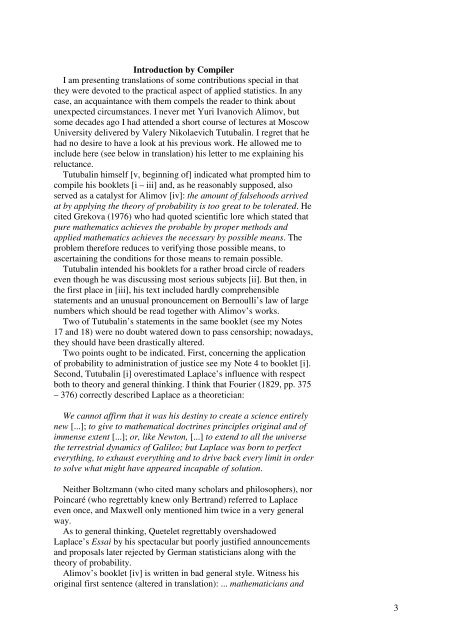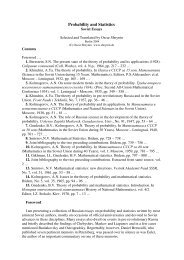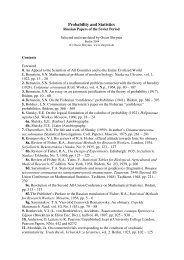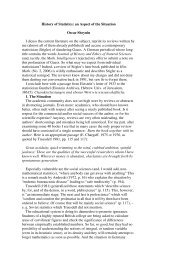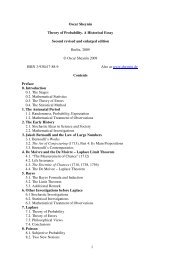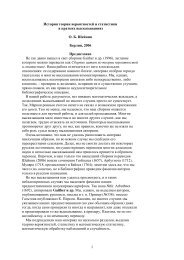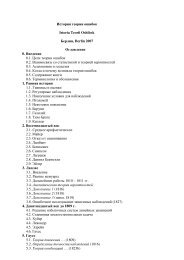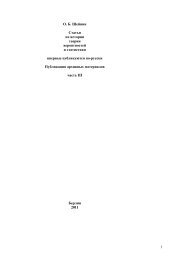1 Studies in the History of Statistics and Probability ... - Sheynin, Oscar
1 Studies in the History of Statistics and Probability ... - Sheynin, Oscar
1 Studies in the History of Statistics and Probability ... - Sheynin, Oscar
Create successful ePaper yourself
Turn your PDF publications into a flip-book with our unique Google optimized e-Paper software.
Introduction by CompilerI am present<strong>in</strong>g translations <strong>of</strong> some contributions special <strong>in</strong> that<strong>the</strong>y were devoted to <strong>the</strong> practical aspect <strong>of</strong> applied statistics. In anycase, an acqua<strong>in</strong>tance with <strong>the</strong>m compels <strong>the</strong> reader to th<strong>in</strong>k aboutunexpected circumstances. I never met Yuri Ivanovich Alimov, butsome decades ago I had attended a short course <strong>of</strong> lectures at MoscowUniversity delivered by Valery Nikolaevich Tutubal<strong>in</strong>. I regret that hehad no desire to have a look at his previous work. He allowed me to<strong>in</strong>clude here (see below <strong>in</strong> translation) his letter to me expla<strong>in</strong><strong>in</strong>g hisreluctance.Tutubal<strong>in</strong> himself [v, beg<strong>in</strong>n<strong>in</strong>g <strong>of</strong>] <strong>in</strong>dicated what prompted him tocompile his booklets [i – iii] <strong>and</strong>, as he reasonably supposed, alsoserved as a catalyst for Alimov [iv]: <strong>the</strong> amount <strong>of</strong> falsehoods arrivedat by apply<strong>in</strong>g <strong>the</strong> <strong>the</strong>ory <strong>of</strong> probability is too great to be tolerated. Hecited Grekova (1976) who had quoted scientific lore which stated thatpure ma<strong>the</strong>matics achieves <strong>the</strong> probable by proper methods <strong>and</strong>applied ma<strong>the</strong>matics achieves <strong>the</strong> necessary by possible means. Theproblem <strong>the</strong>refore reduces to verify<strong>in</strong>g those possible means, toascerta<strong>in</strong><strong>in</strong>g <strong>the</strong> conditions for those means to rema<strong>in</strong> possible.Tutubal<strong>in</strong> <strong>in</strong>tended his booklets for a ra<strong>the</strong>r broad circle <strong>of</strong> readerseven though he was discuss<strong>in</strong>g most serious subjects [ii]. But <strong>the</strong>n, <strong>in</strong><strong>the</strong> first place <strong>in</strong> [iii], his text <strong>in</strong>cluded hardly comprehensiblestatements <strong>and</strong> an unusual pronouncement on Bernoulli’s law <strong>of</strong> largenumbers which should be read toge<strong>the</strong>r with Alimov’s works.Two <strong>of</strong> Tutubal<strong>in</strong>’s statements <strong>in</strong> <strong>the</strong> same booklet (see my Notes17 <strong>and</strong> 18) were no doubt watered down to pass censorship; nowadays,<strong>the</strong>y should have been drastically altered.Two po<strong>in</strong>ts ought to be <strong>in</strong>dicated. First, concern<strong>in</strong>g <strong>the</strong> application<strong>of</strong> probability to adm<strong>in</strong>istration <strong>of</strong> justice see my Note 4 to booklet [i].Second, Tutubal<strong>in</strong> [i] overestimated Laplace’s <strong>in</strong>fluence with respectboth to <strong>the</strong>ory <strong>and</strong> general th<strong>in</strong>k<strong>in</strong>g. I th<strong>in</strong>k that Fourier (1829, pp. 375– 376) correctly described Laplace as a <strong>the</strong>oretician:We cannot affirm that it was his dest<strong>in</strong>y to create a science entirelynew [...]; to give to ma<strong>the</strong>matical doctr<strong>in</strong>es pr<strong>in</strong>ciples orig<strong>in</strong>al <strong>and</strong> <strong>of</strong>immense extent [...]; or, like Newton, [...] to extend to all <strong>the</strong> universe<strong>the</strong> terrestrial dynamics <strong>of</strong> Galileo; but Laplace was born to perfecteveryth<strong>in</strong>g, to exhaust everyth<strong>in</strong>g <strong>and</strong> to drive back every limit <strong>in</strong> orderto solve what might have appeared <strong>in</strong>capable <strong>of</strong> solution.Nei<strong>the</strong>r Boltzmann (who cited many scholars <strong>and</strong> philosophers), norPo<strong>in</strong>caré (who regrettably knew only Bertr<strong>and</strong>) referred to Laplaceeven once, <strong>and</strong> Maxwell only mentioned him twice <strong>in</strong> a very generalway.As to general th<strong>in</strong>k<strong>in</strong>g, Quetelet regrettably overshadowedLaplace’s Essai by his spectacular but poorly justified announcements<strong>and</strong> proposals later rejected by German statisticians along with <strong>the</strong><strong>the</strong>ory <strong>of</strong> probability.Alimov’s booklet [iv] is written <strong>in</strong> bad general style. Witness hisorig<strong>in</strong>al first sentence (altered <strong>in</strong> translation): ... ma<strong>the</strong>maticians <strong>and</strong>3


